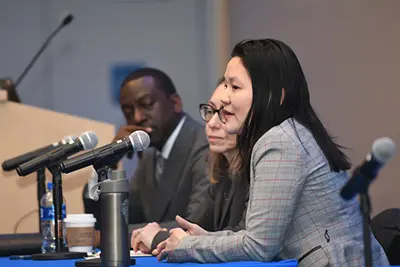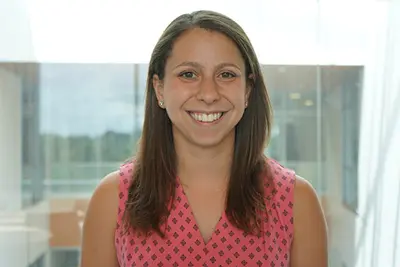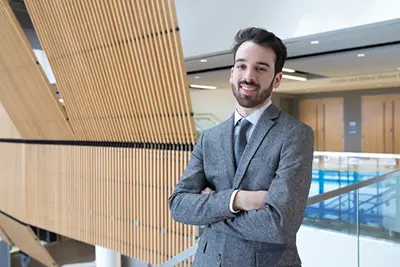Wrongly Convicted Man Discusses How Justice System Treats People of Color
 Image by Tory Wesnofske
Image by Tory Wesnofske
02/27/2019
By Katharine Webster
Kalief Browder was 16 years old when he was sent to Rikers Island, an infamous detention center in New York City, on a charge of stealing a book bag.
Browder spent more than 1,000 days there awaiting trial – including 700 days in solitary confinement – because he refused to plead guilty to a crime he didn’t commit.
After prosecutors finally dropped the charge in 2013, Browder earned his GED and began attending community college. But in 2015, after three psychiatric hospitalizations and two previous suicide attempts, he hanged himself.
Browder’s story, documented by The New Yorker magazine, was the focus of a panel discussion attended by nearly 200 students earlier this month: “Let’s Make a Deal: How the System Failed Kalief Browder.”
The panel was organized and moderated by Asst. Teaching Prof. Erica Katz and sponsored by the School of Criminology and Justice Studies. It included Karen Smolar, former trial chief of The Bronx Defenders, Yusef Salaam, a member of the wrongly convicted “Central Park Five,” and Asst. Prof. of PsychologyMiko Wilford, who researches plea deal decision-making in an effort to reduce false guilty pleas.
“The only thing we were guilty of was being black and brown.” -Yusef Salaam
Salaam, who spent time at Rikers Island, said the conditions there are inhumane, especially in solitary – which is imposed for minor infractions, including having an extra Bible in your cell.
“Those impactful years when Kalief Browder was on Rikers Island damaged him physically, emotionally and spiritually beyond repair,” Salaam said. “I was in solitary for two weeks, and you can definitely go mad.”
Katz assigns the New Yorker articles and a Netflix documentary series, "Time: The Kalief Browder Story," to students in her criminal justice classes. She said that Browder's plight resulted from a perfect storm of systemic problems and inequities.
“Kalief's story is tragic, but it exists as a lesson to us all,” she said. “His story illuminates issues of classism, racism, corruption and a criminal justice system that is simply not working.”
 Image by Tory Wesnofske
Image by Tory Wesnofske
Systemic Injustice
Wilford said that Browder’s case was exceptional because he repeatedly refused to plead guilty. Research shows that juveniles are more likely than adults to plead guilty to crimes they didn’t commit for many reasons, including that they are more susceptible to pressure from prosecutors and less aware of their rights and the consequences of a guilty plea, she said.
Browder was effectively punished for exercising his constitutional right to a trial – and that punishment also violated his rights because it was “cruel and unusual,” she said.
Smolar said the system failed Browder in multiple ways. First, she said, his bail was set at $3,000, higher than his mother, or almost any family in the South Bronx, could afford. Then he was detained, not for the book bag charge, but because his arrest was a violation of his probation for a previous charge – even though there was no evidence the arrest was justified, she said.
Browder also was denied the right to a speedy trial because prosecutors repeatedly asked for postponements, yet no one advocated for his release during years of delays. Had he pleaded guilty, he would have spent far less time in jail, Smolar said.
“That’s the cost of refusing to do what the prosecutor wants you to do,” she said.
 Image by Tory Wesnofske
Image by Tory Wesnofske
Plea deals are a better choice for some defendants because they can return to school, work and their families sooner, or because they may get a chance to avoid a permanent criminal record, Smolar said. But too many innocent people plead guilty because of the so-called “trial tax” – the risk of a long prison sentence if they are convicted, compared with a much shorter term if they plead, she said.
“People plead guilty out of fear and not based on the evidence,” she said. “There’s a disincentive for people to fight cases based on what’s right and what’s fair and whether prosecutors can actually prove their case.”
Race and the Central Park Five
There is also tremendous pressure to falsely confess to a crime you didn’t commit, which happened in his own case, Salaam said. Police arrested him and his four friends, who were black and Latino, for the brutal rape and murder of a female jogger in Central Park in 1989 – and then looked no further, despite a lack of evidence connecting the five teenagers to the crime.
The other four ended up signing false confessions after 36 hours of near-continuous interrogation, he said. Salaam, who was picked up a day after the others, made a verbal confession out of sheer terror when he overheard one of his co-defendants being beaten in the next cell, he said. The teenagers all retracted their confessions several weeks later.
 Image by Tory Wesnofske
Image by Tory Wesnofske
“Everyone who made a false confession did it under threat of dying,” Salaam said in an interview preceding the panel. “You do whatever you need to do to make them stop.”
The victim in the Central Park case was so badly injured that she was in a coma for 12 days and did not remember the attack. DNA evidence showed that none of the five teenagers had raped her. Yet all five boys were convicted based on their false confessions. Even their attorneys told them they had no hope of a favorable verdict, Salaam said.
Black defendants are seven times more likely than white defendants to be wrongly convicted of a crime, because they are presumed guilty, he said.
“There are two systems of justice in this country: One where you’re innocent until proven guilty, and one where you have to prove your innocence,” Salaam said. “The only thing we were guilty of was being black and brown.”
Thirteen years later, in 2002, all five were exonerated by the confession of a convicted rapist and new DNA tests. They sued for compensation for wrongful imprisonment. When the city finally settled with them in 2014, it did not admit any wrongdoing.
“What’s appalling is that even in wrongful conviction cases, there are no mechanisms in place to immediately help them when they are released,” Wilford said. “For them, the battle never ends.”
After the panel, students including Lilian Wainaina, a junior criminal justice major who has taken Katz's classes on Victimology and Gender, Race and Crime, lined up for selfies with Salaam.
"It was very powerful," she said. "He was very soft-spoken and motivational."




